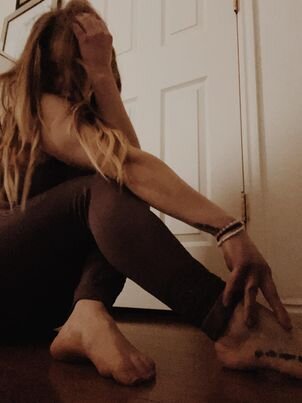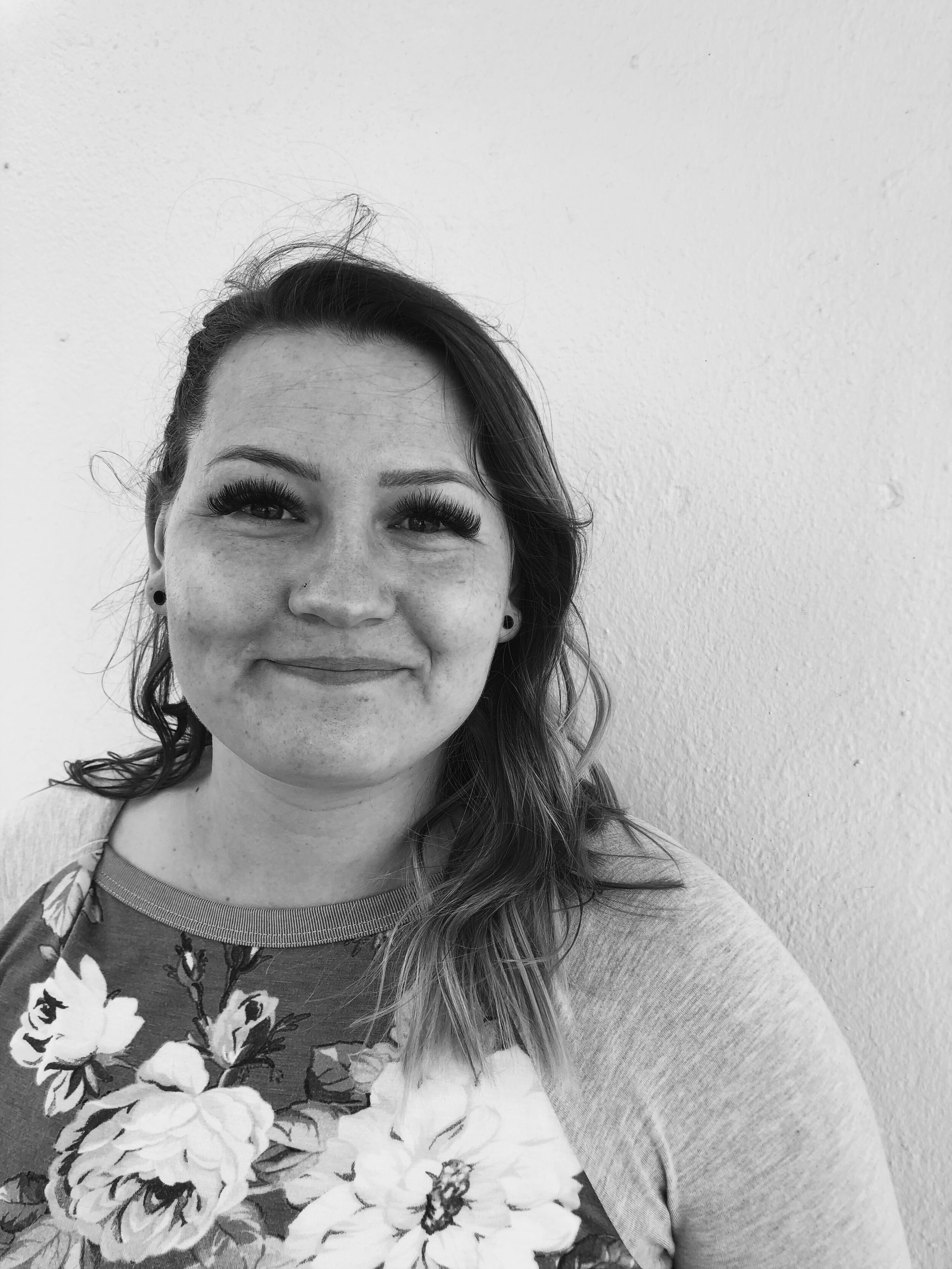Defying Gravity and Age Limits: Flexible Living with Adult Gymnast Peyton Kiggins
In this playful and inspiring episode, I sit down with competitive adult gymnast Peyton Kiggins. Daring to defy society’s age limits, Peyton shares why she re-entered competitive gymnastics, and how she’s a stronger competitor now than when she was younger. Peyton tells us how she stays fit mentally and physically, and what she does to minimize injury and maximize growth and FUN. She highlights the crucial role of playfulness, and offers a helpful and empowering re-frame for failure. She exemplifies how we can do far more than we think - and are often told - we can. Peyton’s approach to gymnastics - and life in general - is remarkably healthy, balanced, and motivating. Listen, and you’ll see what I mean.
Find Peyton on Instagram @peytonamore
Connect with me on Facebook and Instagram @the_nativist
Defusing the F-Bomb: What Feminism Actually Is
Feminism gets a bad rap, and is clouded by myths and misunderstandings. I’m here to [possibly] change your understanding, not your mind. This episode aims to clarify and illuminate something many may support without even knowing it: feminism. I debunk myths, I explain what feminism is and is not, and I share my thoughts and experiences being a woman in this world. If you’re a human, this episode is for Y O U. You decide what to believe and how to live your life.
Happy National Women’s History Month.
Connect with me on Facebook and Instagram @the_nativist
xx,
w
Growing Pains: Avoiding the Traps in Optimization and Finding Your Flow in Grow
We’re constantly encouraged to have a growth mindset; to be disciplined; to always strive to improve and to evolve, in virtually every area of life. But can that ever be taken too far? How do you know when it’s become problematic? What can you do to prevent that? Is there ever a time when a growth mindset is not appropriate or beneficial? What is true growth?
In this solo episode, I highlight red flags to be aware of and questions to consider when setting goals and seeking your highest self. I offer a re-definition of your actual highest self, and explore the importance of self-trust. I differentiate between discipline and dogmatism, and propose how to own your routine (rather than it owning you). I explain why rigid rules are common for those with conditions such as ADHD and eating disorders, and what that rigidity indicates. I reveal the reasoning of why I chose The Nativist brand name, and how I feel about it now.
It’s all so simple, yet so complex. C’est la vie.
Connect with me on Facebook and Instagram @the_nativist
Lightening Up: My Implant Removal Story
Brooke Richardson Photography
In this first episode back after my hiatus, I detail my experience having my breast implants removed. I share with you the health scare that compelled me to finally get them taken out, the explant surgery and recovery processes I went through, and the complications and emergency surgery I encountered. I open up about body image and how I feel about mine post-explant. I talk breast implant illness symptoms, and why this condition is receiving more awareness.
What Does Authenticity Look Like?
“Authenticity does not mean baring all.”
My friend and I were talking the other day about authenticity. It’s one of my favorite topics to ponder, explore, and discuss, increasingly so in this era of social media, filters, and curated images and lifestyles.
To take it a step further, it’s also been even more on my mind during my acne-healing journey. I feel a lot of shame for not having perfectly clear, even-toned, smooth skin. Intellectually, do I know I’m more than what I look like? Absolutely. Intellectually, do I know my true worth is not based on appearance? Yes. BUT. My worth in society, by its standards, very much depends on the image I convey - regardless of how I actually am and look. Society doesn’t care about inner beauty, kindness, grace, intention, depth, excuses, health, REALITY. Its standards are ruthless, rigid, exacting, fluctuating, fickle, impatient, demanding, superficial, and - most importantly - ELUSIVE. Full, true achievement is impossible - always dancing out of reach. Society and its advertisements will convince you with just the right fitness regimen, just the right face cream, just the right fashion aesthetic, you can “make it.” It’s brilliant marketing - but it’s bullshit. What’s in today will be out tomorrow. Whoever is lucky enough to have their natural look align with the current trend (body/face/hair shape, etc) is instantly deemed superior: in looks, in character, in ability, in LIFE. And for those who miss the mark, whether due to mere timing (better luck next on the next “fad”) or total divergence, hope is copiously commodified. What you can’t (or won’t) change/fix, is your fault, your flaw, your demerit. And that’s part of the allure. That’s how they hook you: holding up an example of how you should be/look, with the implicit (or even explicit) acknowledgment you don’t, with the assurance that all you need is this (insert product) to achieve your goal (aka worthiness). And for extra kicks, there’s not just one world judging panel. What’s ideal in one context/culture/era/etc is hideous in another. Contradictions galore - even within the same context; for women especially. Example: If you hide your body, you’re an unattractive prude; if you show your body, you’re a deviant slut. Double standards are part of the game. Mixed signals much? It’s. EXHAUSTING.
But that conditioning runs DEEP. Bone deep, it often feels. If you’re surrounded by something, for every day of your life, it’s bound to permeate. You’re bound to be affected. Your subconscious picks up what society is putting down, and your psyche doesn’t easily release that. We’re wired for social acceptance - it was (and even actually still virtually is) vital to our survival. If you were kicked out of the clan back in the day, your chances of feeding and protecting yourself plummeted. And even today - loneliness is a major mortality risk factor. We’re social creatures - we pretty much all crave belonging.
So yeah, having a pizza face in a world like this doesn’t always feel awesome. And I really hate the thought of needing/wanting face makeup to hide my “imperfections.” In a lot of ways, I have no shame in what I look like. I still wear clothes after they get holes in them. I still face the public after I’ve had a chemical peel or laser treatment. Stuff like that doesn’t bother me at all. Honestly, I think because it doesn’t feel attached to me, to my self worth. If I’m wearing ripped clothes, I can remove them - they’re not part of me. If I have a comically red face, obviously it’s because I just experienced something (even the onlooker doesn’t know what the hell that something is!). It’s not ME. But acne - that feels like it’s ME. Like I just am not good enough, the way I am, and then I need to cover up my so-called “flaws” to be acceptable, worthy, wanted. Yes, I know my friends and family will accept me no matter what I look like. And I don’t expect someone to cruelly comment on my complexion. But they don’t need to - I know what they’re saying. And I’m equating that to my failure to meet the standard: society’s standard I’ve accepted and internalized. Again, do I objectively know how messed up that is? Absolutely. But when that’s tethered to a message the world has relentlessly hammered into you, in multiple (sometimes unknown) ways, your whole life - it’s going to take root. It’s going to take time to de-internalize, to flush out. Is complete system override even possible? Who knows. It feels doubtful, especially right now. But the more we’re aware, and the more we intentionally, personally, and collectively call BS and defy it, step by step, we’ll make a dent, and then a bigger dent, and then a bigger dent.
So speaking of unrealistic societal beauty standards, and speaking of authenticity - I was really bumming. Lately, I’ve really pulled back from showing my face on social media. I try to avoid filters, and I though I hate covering my face in makeup, I don’t feel comfortable bare facing it. I just don’t. My “highest self” would love to say “screw it” and post a picture of myself makeup free - not only to rebel against toxic beauty culture, but also to live and show my truth, to offer hope and light to others, and to be fully authentic. But I’ve realized (much to my sister’s credit) that my mental health matters - and I must honor where I am RIGHT NOW. I don’t have to ignore where I was and where I want to be, but I do have to acknowledge and respect where I am. Right now. And right now, my mental health would really take a hit. I have such an all-or-nothing personality, and I’m learning the value of moderation, of step by step.
Truly though, I felt like such a fraud. Here I am promoting self love, self acceptance, unconditional worthiness independent of our exterior, and yet…I didn’t even feel comfortable posting a picture of myself sans foundation. Because I care about what I look like. And that’s okay. Like I said earlier, we have been and still are inundated with this “conditional worthiness” model every day of our lives. It won’t disappear overnight. It’ll take time, patience, intention, awareness, solidarity, grace, persistence, and compassion. We can simultaneously aspire to something - and promote that something - while living an authentic but complex, flawed existence. This doesn’t have to mean we’re inauthentic or disingenuous. Honesty is key, and so I’m offering my honesty to you.
Which brings us to another subtopic of this: privacy in the context of authenticity. I think for many of us, media - particularly social media - has warped our sense of what we should and shouldn’t share with the world, what we’re obligated to share with the world, and what we’re entitled to know about others (especially celebrities, but also the rest of us mere mortals).
“We’ve come to equate authenticity with transparency and full disclosure.”
I think for multiple reasons we’re susceptible to feeling - and being - pressured to reveal more and more of our inner world: for likes, for attention, for validation, for sales. Vulnerability has become commercialized, leveraged, strategized. In a way, I think this has desensitized us and removed us: from our selves, and from others. “Raw moments” have become content we now scroll past. We want more. Our thirst for it grows, prompting us to not only top our last “share,” but others’ shares. To stand out, to stop the scroll. To prove ourselves. If we don’t bare all, we’re often equated with being fake, posed, superficial. We’ve come to equate authenticity with transparency. We’re nurturing voyeurism and judgment. It’s bad enough with celebrities. I mean, come ON - just because someone is in a movie does not mean they’re obligated to share the details of their divorce, or eating disorder, or addiction struggle. Who are we to think we’re entitled to know that? Do you want YOUR most tender, private moments and issues put on blast? For the world to openly and ruthlessly (and ignorantly) dissect? Where’s the humanity? Your privacy is sacred. More and more I’m really drawn to privacy; to being more selective about what I share, and how I share it. Trustworthiness matters.
Just in case I gave you the wrong impression with my content on here…I’m not always gracious. I’m not always cool, calm, and collected. I’m not always grounded and present. I’m not always sweet and nice (those aren’t always positives anyway). I’m not always motivated. I’m not always sure of myself. I definitely don’t always have it together. I can be fiery and reactive. I can be spacey. I can be frustrated.
Sometimes I feel like a fake when I come on here extolling the virtues of love, empathy, acceptance, calmness, patience, and understanding - then don’t always live those IRL. Do I try? Do I believe in and mean what I say? Absolutely. Every single word. Do I have pure intentions? All the way. But knowing and applying are two different things, right? We know this. Think of all the things you know you should/shouldn’t do for your health/relationships/success - yet don’t/do. For multiple possible reasons (it’s not always just about willpower). Even docs and other experts are humans and experience this. The knowledge alone isn’t enough - it’s what we [consistently] do with that knowledge. In the past, if an expert ever (intentionally or otherwise) revealed fallibility in their own application of the knowledge, I’ll admit, I’d start to doubt/discount their expertise and message. Now, I realize that’s not fair and that doesn’t serve them or me. Just because you don’t always live the answer doesn’t mean you don’t have it. (Gabby Bernstein quote). We’re all human and we all have our own challenges and hang-ups.
Check-ins with yourself can be helpful. This can look like asking yourself the following: Does your life reflect the person you believe yourself to be and say you are? Without you declaring you’re open minded, inclusive, non-discriminatory, generous, principled, ethical, good, etc, how would people know? Could they just tell by observing you? Do your words align with your actions and lifestyle? Does your life speak for itself? Sure, we won’t be our “highest self” every second of every day. Expecting ourselves and others to be is unfair and unreasonable - and a losing game. We’ll have our moments. But overall - what message does the way you live your life convey?
Back to my conversation with my friend, in which we touched on basically all I’ve said up to now. We also talked about how authenticity manifests differently with different people. I mean, it makes sense, right? Your authenticity is rooted in your individuality. It seems obvious, but I think it can be easy to forget. For example, my friend and I were laughing about when during pre-school orientation the teacher expressed interest in hiring my sis for photography and my sis replied, “Let a ho know!” My friend and I were both there, both reacting with jaw drops. We both love my sister for letting her personality shine through. She is who she is and that doesn’t fluctuate depending on her audience/environment. That’s her authenticity. But my friend and I being more selective of when and where to say certain things can be just as authentic. It’s not that we’re masking our selves, our truths, our thoughts, or our personalities - it’s just that we’re adjusting to our environment/audience, and communicating accordingly. Sure, there is potential here for disingenuousness, but it’s not a given.
Furthermore, my friend and I prefer to get ready when we go out into public. Like my friend says, she shows up in the school drop-off line dressed and ready for the day, while other moms show up in sweats and last night’s makeup. This doesn’t mean one mom is more authentic than another or “real” than the other. The “real” in “keeping it real” manifests differently, depending on the individual.
And while we’re at it, I’ve really been thinking lately on how interesting it is where we all arbitrarily draw the line: with politics, with values, with aesthetics, etc. If you’re all about accepting yourself the way you are, does that mean you’re against teeth whitening? Shaving/waxing/lasering (especially legs/underarms on females)? Braces (for aesthetic reasons)? Makeup? Cutting/coloring your hair? Plastic surgery isn’t the only way to alter your body. If you get your lashes done yet denounce cosmetic filler, that’s drawing the line for yourself. And we all have our lines drawn differently. Who’s to say who’s right?
Like I said, authenticity has long been a value and focus of mine. We must first know who we are - and that can seem daunting and confusing. To live your truth, we must know your truth - but what even IS your truth? Sometimes it seems cloudy.
From my personal experience, our truth is always there - and ours to know - it’s not necessarily instantly known to us. And from even before we’re born (with generational trauma, experiences in utero, etc) those layers start multiplying, piling one on top of another, burying our truth further and further down.
To access your truth requires time, intention, experience, love, grace, awareness, STILLNESS. It can be a lifelong process and journey of uncovering your layers and accessing your authenticity. Your true self. Your truth, in its purest form.
I’ve found different phases in my life uncover new, different, deeper layers New experiences, new ages, new lessons unlock new levels; new nuggets of wisdom and truths about myself. It seems like no matter how well I think I know myself (and I’m a reflecter and deep thinker - I thought I knew myself pretty damn well) - there are still always new discoveries and strata to discover. Layers that only time, knowledge, experience, wisdom, and maturity can illuminate.
“There’s no normal. There’s you.”
So like I said, it can all take time, but our truth is always there - and ours to know - even if it’s not necessarily instantly known to us. To access it requires time, intention, experience, love, grace, awareness, STILLNESS.
This doesn’t mean knowing and channeling your authenticity requires a journey of a zillion steps, and in the meantime we’re just buzzing around like a bunch of posers with no idea who we are (though that right there is a pretty loaded surface statement that we could spend some time unpacking. Let’s just say I think we’re all on an authenticity, self-awareness spectrum - and tend to bounce around the spectrum depending on time/environment/subject/etc). There is a superspeed highway, shortcut version to expedite the process and access the authenticity reservoir that is the YOU inside you: get quiet (in any sense of the word - stillness can help, but isn’t required). Calm your mind and body as much as possible, and allow your inner knowing to come through. Pay attention to what resonates, and how it resonates, within you.
Those are your guides: who and what resonate with you.
Thank you for being here and caring. I love you.
A Match for Your Mountain
Suddenly being told to rush your “healthy” baby to the ER because those seemingly minor symptoms actually reveal a serious, lifelong condition would unnerve virtually any parent, especially if you’re a first timer.
Roman Ternus is one special girl in her own special way (you’ll see what I mean in the intro). She sparkles, she dazzles, she charms, and she inspires. She is full of life and light, undeterred by life’s curvies thrown her way. Diagnosed with Type 1 diabetes (T1D) at only one year old, Romey learned early on how to roll with the punches. Romey and her equally lovable and inspirational mother, Jeminee, share their climb.
By listening to this episode, you’ll get even more than just a cute, motivating story from a cute, motivating girl. There are many important messages in here: accepting and re-framing life’s challenges; recognizing and leveraging your inner strength; embracing and cultivating your partnerships; accessing and channeling bravery; and respecting and heeding your intuition. You’ll also hear important signs to look for to detect T1D.
Jeminee tells us her initial thoughts and reactions, and how she sustains her strength and gratitude through the demands of caring for a child with T1D.
This episode is a story of resilience, of hope, of hope, and of gratitude, and it serves as a powerful reminder YOU are a match for YOUR mountain.
Below is the full video to the audio snippet you’ll hear in the episode’s intro (so you can really see little Romey shine!). Find this and more on Jeminee’s Instagram page: @jemified_
Thank you for listening. Thank you for caring.
-w-
Go.Connect.Win.
I’ve said it before and I’ll say it again: connection is key. It’s why I constantly pose the questions I do: on here, on social media, in person. Even my Would You Rather Wednesday questions (I post weekly on my Instagram and Facebook stories) have purpose. Sure, part of it is just to have fun, but the larger part is to connect you to yourself. To deepen your awareness of yourself. To assess and realize your views, to facilitate your familiarity with your fears, your values, your hopes, your possible blind spots, your biases, your…everything that makes you you.
We’ve heard it before: changing the world starts within, with us individually.
In this episode, I talk about how connecting first to ourselves, and then to others:
heightens our happiness and sense of meaning and fulfillment
strengthens our relationships
nurtures our understanding of self and others
lengthens our lives (it’s science, baby)
clears the layers blocking connection to others
lessens divides
facilitates solutions
informs choices
improves, you know…EVERYTHING
I offer questions to ask yourself to gauge how connected you are to yourself. I give guidance on how to [further] connect to yourself, so you can show up authentically, as well as suggestions on how to connect to others. I get personal about times I’ve felt disconnected and how that’s impacted my life and relationship.
So instead of go fight win, the new slogan is GO CONNECT WIN.
Find me on Instagram @the_nativist
Love you. Mean it.
-w-
The Depths of Despair
Light and love and…despair.
Despair. I sure as hell have felt it (I don’t say that glibly - I mean it). Chances are you’ve also felt it (to whatever degree). If you haven’t (yet), you likely know someone who has/is feeling it.
It’s part of the human experience, so let’s respect it, and let’s talk about it: for ourselves and for others.
If you’re seeking a message of hope, this is for Y O U. I had no idea what to speak on today, so I said a quick prayer for insight on what message was needed. I took a couple of deep breaths and “despair” floated through, immediately and clearly.
This initially threw me off, because it doesn’t resonate with my current experience. However, like I said - I’ve been there. And like almost all of my content, I don’t usually share what’s reflective of my current situation - I let my intuition guide me to what’s resonant for yours. And it’s always delivered.
In this episode, I open up and tell you my relationship with despair, and how despair has shown up in my life. I also offer a tried-and-true, CONCRETE action you can take when feeling lost/frustrated/hopeless/defeated/untethered - or just “off.” Works [for me] every.single.time.
I identify why I started The Nativist, and how that relates to you.
Thank you for showing up and doing what it takes - for yourself, and for those around us.
-w-
Heal for Real
This is for you if: you’re always tired - no matter how much sleep you get; you have more questions than answers regarding your health/body; you’ve ever experienced chronic illness/pain; you feel like you’re battling your metabolism; you have lingering health questions that are never quite satisfactorily answered; you feel OK now but want to feel as great as possible in 10, 20, 30 years; you want to optimize your health and nutrition; you feel like you’re at war with your skin (this is especially for you)
And if you love inspiring stories - you’ll like this.
In this episode, I talk to Jackie Lee Gibbs, who shares her self-transformation journey of healing from severe acne following the Medical Medium protocol. Jackie tells us what she did to radically transform her skin, and how doing so led to an internal transformation as well.
Though we do talk skincare, this conversation extends far beyond that into general health and wellness. We discuss facing and navigating adversity, trusting yourself and your body, investing in your health, and leveraging your experience to help others.
More than anything, this episode is a message of hope: for those of us feeling discouraged/betrayed by our body/lost/overwhelmed/confused. This is for you.
I highly encourage you to further explore the Medical Medium’s work, whether through his blog here , his Instagram account @medicalmedium, his podcast (iTunes/Apple Podcasts/Spotify), or his books. Your mind will be blown. I spent several years and countless hours seeking and researching answers, seeing multiple specialists and spending thousands of dollars, only to end up with no relief or answers for my health issues. The answers I received never quite explained everything or fully connected. It was only when I read Anthony William’s (the Medical Medium) information that everything.finally.clicked. Everything.
I’m a believer.
You can find Jackie on Instagram @myskintruth where she shares tips on caring for your skin internally and externally, gentle skincare and skin-healing tools, healing plants and recipes, skin-healing inspiration and compassion, kitchen tips and tricks, the healing process, and her self-transformation journey. If you’d like to work with her, you can contact her via her website here
Taking Accountability and Regulating Our Emotions
This post (and it’s corresponding podcast episode) is per request - and is also actually a specific topic I’ve really wanted to tackle.
Today we’re talking about taking accountability for our actions, and for regulating our emotions.
And as you’ll soon see, there is so.much. to cover here. It’s good stuff, so let’s dive in.
Below, you’ll find a transcription to this episode, so you have the option to read/listen!
You might’ve heard it’s not what hand we’re dealt - it’s what we do with it. We’re not responsible for the initial hand we’re dealt, but we are responsible for how we play it. It’s on us to do something with it. (This right here is a whole other conversation about privilege, drive, luck, agency vs. destiny, etc - but we’ll stay on the surface here.)
It’s easier to blame than it is to take accountability and do the work. And sure, there are legitimate sources of blame, and legitimate challenges (trauma, etc) we’ve experienced that have caused our situation. This doesn’t discount those. Those should be acknowledged and emotionally/physically/psychologically processed, etc. Also, this is pretty nuanced and not always as simple as just willing your way through something. but at the end of the day, still, to truly heal and move forward is up to us. And sometimes (and often) moving forward comes through seeking/accepting the help and resources we need, at least to give us a solid footing. While seeking and receiving may seem passive, and may seem like offloading the responsibility - that’s just not so. They’re active approaches to healing and resolution. We can be surrounded by the best resources and help in the world, but unless we let it in - it’s useless. and the letting it in is entirely up to us.
Let’s tilt this to a slightly different angle. Let’s talk about when people do us dirty, or create the problem. I just got done with my addiction series. Part of this included the perspectives of wives of addicts. Far and away, the most effective and powerful approach and resolving factor were the wives attending to their side of the street. Did they cause the issue? No (though this can get nuanced in many cases, as there are multiple contributing factors in situations involving addiction). But what/whom we’re talking about here, no - the wives were victims here, so to speak. Are they justified in getting angry and blaming their spouse? Sure, absolutely. And it’s important to feel your feelings and express them as necessary, and to not try to good vibe your way out of it, thereby repressing emotions. All emotions serve a purpose and have value, and repressing them only delays (and often magnifies and worsens) their expression. What we resist persists. They’ll come out eventually - usually at a greater magnitude and worse moment. But these wives credit their survival and current mental wellness with working on themselves: seeking therapy, turning inward, etc. They reflected on their own issues, and how those issues were impacting the current situation, and their reactions to the current situation.
For one of the wives, this meant she ended up taking her baby and leaving her husband (which took remarkable strength and courage, considering how young she was and what little she had). Now, she’s healthy, happy, and newly married. She took ownership of herself and her situation. Often, these tough times are gifts because they reveal what isn’t working, and (sometimes forcefully) nudge us into facing and handling that. One of the wives stayed with her husband, and he credits her individual self work for his sobriety. He told me his wife’s “working on herself” was the best thing she could have done because I noticed and wanted to be better as well, which was a huge factor [in] why. I tried to give up alcohol many times before, and when she was finally healed enough to leave, I became strong enough to quit.”
And that’s important to note too: Our actions have ripple effects. We have the power to inspire and uplift others. When we take care of ourselves, that radiates to those around us, and affects the world. When we rise, we can take others with us. Not that that should necessarily be our reason why, but it’s a beautiful secondary motive.
Now let’s talk about when someone says/does something that pisses us off. Bums us out. Triggers us in any way. We often hear (and might even have said): “You made me so mad.” “You hurt my feelings.” “You made me ____ (fill in the blank).” In reality…they’re the stimuli - and how we react to that stimulus is ultimately up to us. As in any scientific experiment, the stimulus is different from the reaction. Different forces. Different entities. And so it is here. Our reaction is and should be separate from what stimulated it.
You might’ve heard the quote by US First Lady Eleanor Roosevelt, “No one can make you feel inferior without your consent.” To give more context to this, Eleanor was responding to reporters’ questions regarding an awkward event in 1935. The Secretary of Labor in the Roosevelt administration was invited to speak at the University of California, Berkeley on the Charter Day of the school. The customary host of the event was unhappy because she felt the chosen speaker should not have been a political figure. She refused to serve as host, and several newspaper commentators deemed her action as a rebuff and an insult. Eleanor was asked at a White House press conference whether the Secretary had been snubbed. “A snub” defined the first lady, “is the effort of a person who feels superior to make someone else feel inferior. To do so, he has to find someone who can be made to feel inferior.”
Another analogy that comes to mind for me is the stimulus (the word/action) is the seed and we are the soil. Whether that soil is fertile (for offense, reactivity, etc) or infertile (repellant to offense) is up to us. And there are quite a few contributing factors to our soil’s fertility, or lack thereof. A reaction is not predetermined and is not automatic. There is space between the stimulus and the reaction. Within that space, power is transferred from the stimulator to the receptor. In the space, we as the receiver get to determine (however consciously and intentionally is up to us) our response.
Here’s where it gets tricky: sometimes that response is hijacked by our subconscious. Our fears and insecurities override our logic, our reasoning, our values, our best intentions. Perhaps our unhealed trauma wounds are triggered, and those are POWERFUL, especially if incurred during our formative years in childhood. We largely and often can’t control if/when we experience trauma, to whatever degree it is. I am in no way victim blaming here - ABSOLUTELY NOT. But for us to extricate ourselves from its chains that strive to control our lives - we must first recognize, and then own it. And this comes through shadow work. Through introspection. Through facing ourselves. Through digging in and getting honest. This process is typically helped by professionals, and trusted loved ones (especially if the trauma is significant). They can illuminate our blind spots, maintain objectivity, and maintain necessary and beneficial objective distance. Even with their help, though, we’re still responsible for doing the work.
As you’ve likely figured out by now, what happens in our formative years affects us today. One of the best ways to get to know someone is to ask them about their childhood. I personally had a fantastic childhood with wonderful, loving, involved parents. However, like virtually everybody else, I still have my stuff. I still have triggers and hangups I’ve had to work through. It’s not always necessarily a reflection of the efficacy and love of your caregivers. None of us make it through life without some wounds. Sometimes, they’re just surface scratches, merely getting our brief attention. Sometimes, they’re bone deep, and if we don’t properly treat them, they worsen and become infected, and that infection spreads, affecting what’s nearby.
For me personally, I would often feel unseen and unheard. As part of this, I also outsourced my validation, and was very reactive. Reactivity is a sign of poor self-emotional regulation. If our moods and our actions and our words depend upon people/situations outside of us, we’ve ceded our power. We’ve ceded our calm and our happiness. We’ve ceded our stability. Only when we can practice that pause, to grant us space between what happened, and how we will handle what happened, will we be empowered. When we respond, rather than react, we feel better and do better. Part of this is recognizing the separation of the stimuli, our thoughts, and our actual core self. If we maintain this distance, we can ascertain when our fears are trying to hijack, when our insecurities are trying to cloud. Otherwise, we’re tossed around by the ever-changing winds, at the mercy of situations and people.
I can tell you from personal experience what a freeing feeling it is to reclaim your power and maintain that calm in the storm. It feels better for you, it feels better for others. Our actions have ripple effects. We don’t live in a vacuum. So you can imagine the compound effect of reactives interacting with other reactives. No wonder we have the division and discord in our world: in relationships, in communities, in business, in politics, in friendships, in religion. We can be powerful catalysts for change, on a micro and macro level, simply by learning to regulate our emotions. Defusing situations by remaining grounded and aware.
Self awareness is key, and not everyone is fully self aware. We’re all at different parts of our journey, to put it euphemistically. In a recent relationship, I saw firsthand - from the other side - how destructive poor emotional self-regulation can be.
A little bit of a back story. Codependency can manifest in various ways. I was codependent in the sense I was a “fixer” and derived my sense of value and worth from fixing, from accommodating, and from caretaking. This is good to an extent, but not in excess, and not to the point of self abandonment. Neither wins when only one set of needs/wants is being met. In a way, I was using that “fixing” and self-denying to regulate my emotions: to feel needed, to feel valuable, to feel desirable, to feel in control, to feel indispensable.
On the other side was my boyfriend, who was codependent in the sense he wholly depended upon externalities to determine his mood, sense of self worth, and identity. I know why he was the way he was (family dynamics in the formative years for the win). I empathize and feel for him. Even so, it was tough to experience. For BOTH of us. Frustration abounded on both sides.
On my side, I’d feel enormous pressure to accommodate his insatiable need for validation. A simple compliment wasn’t enough. Nope. Each one needed to be multi-sentenced, deep, fresh, nuanced, and heavy-hitting. Every single one. Multiply this by 15 or so - A DAY. It was exhausting - which is ironic, because genuine, heartfelt, customized acknowledgements and compliments are my thing. But this just felt forced, and pressured, and required. Don’t get me wrong, he gave what he expected. He could be the king of compliments. But it all felt so heavy. For someone who loves swimming in the depths, pretty soon I was gasping for air.
If we didn’t have the exact same opinion, he’d take it as a personal attack. A condemnation of his taste, his character, his judgment. He wouldn’t directly communicate this - because he needed external harmony for his internal peace. So nothing ever truly got resolved. He’d say one thing and mean another. Not because he was trying to deceive or lie or put one over on me. He was trying to fulfill his idea of what a perfect boyfriend, a perfect son, a perfect citizen, and a perfect employee would do/say, whether or not that reflected his truth. He NEEDED people to view him a certain way because he needed their approval for his own. Their validation of him translated to his validation of him. He didn’t dare to let his true feelings and self show, for fear those would be judged, condemned, discounted, dismissed, and found lacking. (I think many of us can relate to that - humans have worn masks long before COVID-19.) Therefore, he wasn’t truly expressing himself. We could never truly connect, because connection requires authenticity.
He had an internal script he needed the world and its people to follow for him to maintain peace and happiness. As a fellow world dweller, I’m sure you know by now, the world obeys NO script. If we have a script, it laughs and flips the middle finger. Life happens. And people have agency and their own wants/needs/fears/problems/objectives. We’re all just muddling around together. Sometimes those factors align, and often they clash. C’est la vie. We can’t control others - only ourselves. And that right there underscores the importance of learning how to regulate ourselves, and not cede this power to others.
Though he never communicated the content of his script, I’d sense it. And just like I loathe others telling me what to do, this was no different. Not a recipe for romantic bliss. I felt exhausted and resentful for all he required of me, and he felt unfulfilled and unsupported. My resentment would grow, and his frustration would increase. I remember one particular argument wherein he criticized me for “making” him feel and react a certain way. I pushed back, cited Eleanor Roosevelt, and asserted no one can “make” us feel anything - our response is up to us. He clearly let me know he did not agree.
As with anything else, this is nuanced. It’s not as easy as just emotionally distancing ourselves from anyone or anything with which we interact. There’s actual value in being affected by situations and people. It’s an integral part of empathy, and connection, and progress. Feeling inspired by a friend’s win, feeling gutted by a community tragedy, feeling uplifted by a stranger’s remark.
What we’re talking about here is the RESPONSE, not the initial reaction - both internally and externally. Knowing our worth doesn’t fluctuate - it’s constant and it’s real - whether or not you/others see it at any given time. It doesn’t depend on what you do, what you say, what you believe, what you achieve, what you look like.
Really, any time we’re triggered, fear is the underlying emotion. Fear of physical/emotional pain. Fear of not having enough to meet our physical/emotional needs (prompting a scarcity mindset). Fear of the unknown and how it could affect our current wellbeing (nurturing xenophobia). Fear of being deemed inadequate (causing shame).
So let’s think about shame. Shame is what happens when we view ourselves through others’ eyes. What if you removed that filter? What if instead you asked yourself - and only yourself - if you’re okay with that action/characteristic/thought? If it/they align with your values, or if they contribute to the kind of person you want to be, or if they harm others? If your opinion was the only one that mattered, are you okay with the person you are? With what you’ve done and how you did it? With what you do and how you do it? With who you are? When you think of your ideal self, is that conceived by you or others? Are you able to separate others’ views/expectations from your own?
It’s not your job to like me. It is my job to like me. And vice versa. You’re not obligated to like me, and I’m not obligated to try to get you to like me. And vice versa. It’s not your job to scale my walls to give me love. It’s my job to open myself up to receive love (all kinds of love: familial/romantic/platonic). And vice versa. This opening to allow love comes from shadow work, self reflection, self awareness, self development, self acceptance, and self love. All inside jobs.
People can be fickle and mercurial. They can be blinded by their own fears/insecurities/distractions. They have their own stresses and worries. They can get hung up on certain surface characteristics, certain defensive mannerisms, certain societal detractors, certain psychological disruptors (in themselves/others). We don’t always clearly see others (because we often don’t clearly see ourselves!). Many are simply reacting, rather than responding. And then others react to those reactions, and so on. Dominoes action. Chaos, right?
But we can do our part to mitigate and lessen that chaos - by taking responsibility and being accountable for ourselves, and our responses.
Two concepts that changed my life are: impermanence and subjectivity. Before, if I got rejected for a team, or an opportunity, or a _______ (personally/professionally), I’d accept and internalize defeat. View that “ruling” as final and binding. Not anymore.
Now I accept “defeat,” sure - but I keep it contained and in its appropriate context. I don’t view it as an attack on my worth, identity, or ability. I accept it and move on - either in further pursuit of that same objective (if that’s what I truly want) or another (if I choose to redirect). I use the feedback to adjust and improve if necessary.
I also recognize it’s all subjective: others’ personal/professional opinions of me. No matter how accomplished or experienced or cool they are. Humans can do miraculous feats (learn new skills, master existing skills, etc) when properly motivated. We all have so much power and potential - independent of others’ opinions. Another’s recognition of this and acceptance of us doesn’t diminish this.
Let’s not outsource our acceptance, our validation, and our happiness.
And sometimes others will hold us accountable, as they should. This can be uncomfortable at best, and infuriating at worst, especially when it comes to our unconscious biases, especially regarding racism and sexism. We all have blind spots. We all have biases - they’re a cognitive requirement of being human. But rather than getting triggered, let’s filter those accountability call outs through that pause between stimulus and response. Let’s examine if and why it resonates with us. Let’s examine if and why it angers us. Let’s examine if and why it saddens us. Let’s analyze it as objectively as we can (we’ll never achieve full objectivity, but shooting high helps elevate our landing spot).
And while we’re at it, this is a solid and key practice for every other situation in life. If we find we’re triggered by someone/something, it’s incumbent upon us to delve in and identify why, instead of offloading onto the offender and others to regulate our emotions and to adjust to our “script” (sound familiar?). If we don’t want others to do that to us, why would we expect them to allow us to do it to them? For example, if we see a scantily-clad woman feeling herself and posting a selfie, and we feel disgust - that has NOTHING to do with that woman or her actions, and everything to do with our response to it. What’s driving our disgust? Envy of her confidence and audacity to shatter the shackles of society and its [fickle] beauty/decorum standards? Envious because we ourselves don’t dare to do so? Insecurity with our own body? Moral indignation she is dressing immodestly and not respecting our belief system?
This doesn’t mean we accept responsibility and blame for everything that happens. Not at all. It simply means we can only control ourselves, and for our own health, wellbeing, stability, and happiness, we have to take ownership of ourselves. This is so we can lessen our reactivity and triggers. And this doesn’t mean we must always remain stoic and reserved and nice. NOPE. We’re humans. And sometimes strong situations call for strong responses.
And you may have heard me speak repeatedly on the importance of boundaries. They are PARAMOUNT to our individual and collective health, wellbeing, and success. IMPERATIVE, y’all. They allow us to set boundaries without being consumed and leveled by guilt and people-pleasing instincts (thereby saving our precious bandwidth for what truly counts and preventing suffocating resentment when we’re maxed out and not acknowledged by those we’re pleasing). They also allow us to respect when others set boundaries with us (because none of us are perfect, remember? Nor omniscient). Boundaries are for our individual and collective good. They allow us to reserve our time and energy for what we need to focus on, thereby helping us be more compassionate, less depleted, more fulfilled, and more effective.
The Internet has a wellspring of self-regulation options and guidance. Here are a few tips:
Acceptance and curiosity. First step, accept. ALL of our emotions are messengers, conveying valuable info we can use to improve our understanding of ourselves, the situation, and possible solutions. And by staying curious, this eases the weight of the feeling(s). It infuses it with wonder, which makes it more enjoyable, and motivates us to explore further (thereby hopefully preventing - or at least reducing - future occurrences). It also shifts the focus from problem to possibilities, from misery to musing, from suffering to solution.
Regulation over repression. Like we said before, what we resist, persists. Repression just kicks the ball down the road, and facilitates festering.
Identify your feelings. As Daniel Goleman, PhD and two-time Pulitzer Prize-nominated author and science journalist advises, recognizing and naming your emotion arrests the progress of the “negative” feelings. When you feel yourself getting angry, simply saying, “I’m getting upset” shifts the energy from your emotional center to your verbal cortex. BOOM. Life hack.
Keep a mood journal. This will help with venting, with recognizing triggers and patterns, and with illuminating blind spots.
Seek insight from a professional or trusted loved one. Therapy is a yes for EVERYONE - whether you feel you need it or not. They can listen objectively, provide perspectives to consider, and give guidance on effectively reframing and navigating it all. But if you’re not jazzed about that - for personal or financial reasons - a trusted individual can also offer valuable feedback on aspects about yourself/situation, and illuminate blind spots.
Allow yourself space - literally and figuratively. This is important. Sometimes situations demand immediate attention/action - in which case deep breathing is key - but otherwise, time and space to collect your thoughts and connect to yourself can make all the difference, both in how you feel and how you respond.
Breathe. Breathing is shockingly simple yet astoundingly effective. Whether you want it to or not, breathing deeply activates your parasympathetic nervous system. This signals your brain to tell the anxious part you're safe and don't need to fight, flee, or freeze. Deep breathing gets more oxygen to the thinking brain, so you’re able to respond more effectively and feel better doing it. There are various methods: box breathing (eg inhale 5 seconds-hold 5-exhale 5-hold 5 and repeat); inhale 4 seconds-hold 7-exhale 8 and repeat; and simply exhaling longer than you inhale - for as many rounds as any of these take to feel more relaxed.
In summary:
It’s up to us to regulate our emotions. It’s not on others to make us feel happy, or soothed, or comforted, or calm. Others don’t make us mad, or sad, or frustrated.
That’s on us. They supply the stimulus, we provide the response.
Sometimes those are knee-jerk reactions. Sometimes mental health issues/trauma/patterned thinking and behavior/fear/stress/insecurities drive those reactions.
Sometimes we can override them.
That’s why self awareness is crucial to empower us to respond, not just react.
Fragility is when we’re owned by the stimulus.
Like Viktor Frankl, the Austrian neurologist, psychiatrist, philosopher, author, and Holocaust survivor says: “Between stimulus and response there is a space. In that space is our power to choose our response. In our response lies our growth and our freedom.”
Addiction Series Part 5: My Husband Overcame Alcoholism
Today’s episode is moving, it’s enlightening, it’s illuminating, it’s inspiring… It’s as remarkable as the woman who shares it: Mindy Cervantes.
Mindy candidly and compassionately shares her story of being married to someone addicted to alcohol. She takes us through how it began, how it progressed, and how it resolved. She outlines what steps she took on her end to empower and heal herself, so she could deal with the issue, and notes how those steps actually revolutionized not only her relationship with her husband, but also her relationship with herself and others. She highlights the importance of doing our own work, whether we’re the addict or we’re supporting one.
She answers the million dollar question of what was finally the catalyst for change. She spotlights the less-often discussed phase of navigating post-sobriety and its accompanying questions and considerations.
As in past episodes, we emphasize addiction touches us all, whether directly or indirectly.
The website Mindy mentions is www.loveoveraddiction.com and you can click here for the podcast.
Find and follow Mindy on Facebook @MindyCervantes and Instagram @mindy.d.cervantes
I thank you and I love you.
-w-
Addiction Series Part 3: My Dad Was an Alcoholic
The series on addiction continues. In this episode, my long-time amiga Nicholia speaks on addiction in general and alcoholism in particular. Not only has Nicholia specifically taught on the subject to her high school students, but she also personally experienced it in her home growing up (and into adulthood).
Nicholia shares her experience of having an alcoholic parent, and how that affected her own parenting. She describes how her mother’s approach to it was especially impactful to Nicholia, as a person and as a mother herself.
She tells us about the scary close call that finally led to her father’s sobriety, after doubting it would ever happen.
We discuss generational trauma and how our current habits (and addictions) impact not only us, but our posterity. We emphasize the importance of digging into the discomfort and facing your demons, to heal and prevent generational and current trauma.
Nicholia gifts us with wisdom and a gorgeous message of hope.
Getting Real About Trauma
I’m back with a heavy-hitting episode, wherein my brave and wonderful friend Stormy Heinz shares her experience with trauma: both as a survivor and an educator.
Sound personally irrelevant to you? Hold up. Just because you yourself have not experienced significant trauma, many, many others have, whether they’ve revealed (or even recognized!) this or not. And trauma affects ALL of us, if not directly, then absolutely indirectly. Statistics clearly show how disturbingly prevalent it is (human trafficking ring a bell?), and its far-reaching effects on our relationships, our communities, and our society in general. You also might be surprised to learn what qualifies as trauma - something we touch on in our chat.
Stormy and I discuss various manifestations of trauma, and its cascading ripple effects. Stormy offers guidance on addressing and coping with trauma, whether as an experiencer or a supporter. She also mentions the ACEs test (Adverse Childhood Experiences). You can take the ACEs test here
To learn more, check the CDC’s ACE Study website.
There are some solid life truths in here, so it’s definitely worth a listen.
Stormy is an English teacher, with a BA in English and an MEd in curriculum and instruction with an adolescent literary emphasis. She also instructs fellow educators on recognizing and handling trauma in students.
Thank you.





































